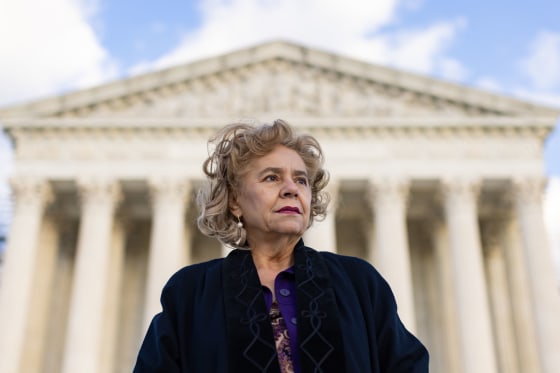WASHINGTON — The Supreme Court on Thursday revived a civil rights claim brought by a Texas woman who served on a small-town council and was arrested following her criticisms of a senior official.
The ruling on an 8-1 vote gives Sylvia Gonzalez another chance to bring a retaliation claim, with the court sending the case back to a lower court for further proceedings.
"No one should have to go through what I went through, and with this decision, I'm confident it won't happen again," Gonzalez said in a statement.
The case focused on the scope of a 2019 Supreme Court ruling called Nieves v. Bartlett, which said plaintiffs generally cannot bring retaliation claims when police make lawful arrests.
Gonzalez, who was 72 at the time, was arrested in 2019 soon after having taken office as a council member in Castle Hills, Texas. She had run for election as a critic of the city manager.
Gonzalez was charged with inappropriately removing a government document, identified as a citizen petition she had prepared.
She said she had not intended to take the document, which was mixed up with her other papers.
The charges were eventually dropped, but only after Gonzalez, who has no criminal record, spent a day in jail. She also quit her elected position.
Gonzalez sued, saying the arrest constituted retaliation for expressing her complaints against the city manager, Ryan Rapelye. She alleged officials had violated the Constitution’s First Amendment, which protects free speech rights.
Castle Hills Mayor Edward Trevino, then-Police Chief John Siemens and a lawyer engaged to assist with the investigation, Alex Wright, were all named as defendants.
At issue in the Supreme Court case was Gonzalez’s effort to overcome a procedural roadblock to pursuing her lawsuit.
Gonzalez’s lawyers at the Institute for Justice, a libertarian legal group, said she should be able to bring her claim under a 2019 Supreme Court ruling called Nieves v. Bartlett.
The ruling said that in most cases when police have probable cause to make arrests, plaintiffs cannot bring retaliation claims.
But, the court added, in limited situations cases can move forward if plaintiffs can show that other people in similar situations had not been arrested, even if there was probable cause.
In Thursday's unsigned ruling, the Supreme Court faulted the New Orleans-based 5th U.S. Circuit Court of Appeals for how it analyzed whether Gonzalez could bring her claim.
The lower court wrongly concluded that she had to provide a "very specific comparator" to show that others have committed the same conduct but not been arrested, the Supreme Court ruled.
The evidence presented by Gonzalez showing that "no one has ever been arrested for engaging in a certain kind of conduct" could be enough to allow her claim to move forward, the ruling said.
Justice Clarence Thomas was the sole dissenter, saying Gonzalez's concession that police did have probable cause to arrest her should mean her lawsuit cannot continue.

